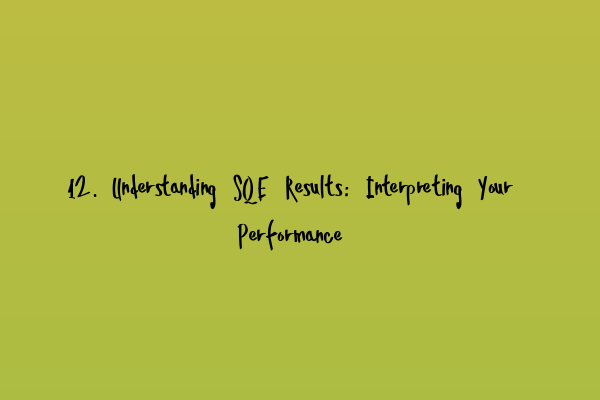Understanding SQE Results: Interpreting Your Performance
As an aspiring solicitor, your journey towards qualification includes successfully passing the Solicitors Qualifying Examination (SQE). This rigorous assessment is designed to evaluate your understanding of key legal concepts and practical skills necessary for legal practice in England and Wales. Once you’ve completed the exam, you’ll eagerly await your results, which will provide crucial insights into your performance. In this article, we will guide you in interpreting your SQE results to gain a better understanding of your strengths and areas for improvement.
1. Overall Mark Analysis
The SQE is divided into two stages, SQE1 and SQE2. SQE1 focuses on assessing your functioning legal knowledge, while SQE2 evaluates your practical legal skills. Upon receiving your results, the first thing you should examine is your overall mark. This mark reflects your performance across all the assessments within each stage.
To effectively interpret your overall mark, it is essential to have a clear understanding of the grading criteria. The Solicitors Regulation Authority (SRA) adopts a competency-based approach to assessment, which means that you are assessed against specific performance criteria. These criteria usually encompass areas such as legal knowledge, application of the law, analysis, communication, and problem-solving.
2. Substantive Knowledge Breakdown
Next, you will want to delve into the breakdown of your results to analyze your performance in different areas of substantive legal knowledge. This breakdown can provide valuable insights into whether you have grasped the core legal principles and concepts required for legal practice.
For example, your results may reveal that you excelled in contract law but struggled in criminal law. To understand the reasons behind these differences, you can further explore the specific topics and sub-topics within each subject area. This analysis will help you identify your strengths and areas that require further attention and revision.
If you find that you need to brush up on certain legal areas, consider engaging with comprehensive resources such as the Contract Law SQE Study Materials, which provide in-depth explanations and guidance on complex legal topics.
3. Practical Legal Skills Evaluation
In addition to assessing your substantive legal knowledge, the SQE also evaluates your practical legal skills through simulated scenarios and tasks. Your performance in these assessments will determine your proficiency in areas such as interviewing clients, drafting legal documents, and advocacy.
When reviewing your practical legal skills results, pay close attention to any feedback, comments, or suggestions provided. These insights will help you identify specific areas where you can enhance your skills and develop a more robust legal practice toolkit.
To hone your practical legal skills, it is vital to engage in experiential learning opportunities that mimic real-world legal scenarios. By immersing yourself in practical exercises and simulations, you can build confidence and refine your abilities. Consider participating in mock client interviews or taking part in practical training workshops offered by reputable legal training providers.
4. Reflecting on Performance
Interpreting your SQE results requires a balance of self-reflection and objectivity. While it’s important to acknowledge your achievements and strengths, it’s equally crucial to recognize areas that require improvement.
Use your results as a roadmap for your ongoing learning and development journey. Embrace the valuable feedback provided by the examiners and build on it. By focusing on areas where you can make the most significant gains, you can refine your legal knowledge and skills in a targeted manner.
Remember, passing the SQE is not simply about achieving a specific score; it’s about continuous learning and growth. Approach your results with a growth mindset, committed to refining your knowledge and skills in pursuit of professional excellence.
5. Further Learning Resources
To support your continuous learning and improvement, we recommend exploring the following related articles:
– “Unveiling Duress and Undue Influence in Contracts” – Gain a deeper understanding of the impact of duress and undue influence in contract law. [Link to article]
– “Essentials of Consideration: Understanding the Backbone of Contracts” – Strengthen your knowledge of contract law fundamentals by exploring the concept of consideration. [Link to article]
– “Express and Implied Terms in Contracts: Decoding Agreement Components” – Learn how to decode the various components of a contract, including express and implied terms. [Link to article]
– “Counter-offers: Navigating Negotiations in Contract Law” – Navigate the complexities of negotiation in contract law and understand the significance of counter-offers. [Link to article]
– “Mistake in Contract Law: Unraveling the Impact on Agreement Validity” – Explore the effects of mistakes on the validity and enforceability of contractual agreements. [Link to article]
These resources provide valuable insights and in-depth analysis of key contract law topics that can further enhance your understanding and performance in the SQE and beyond.
In conclusion, interpreting your SQE results is an essential step towards enhancing your legal knowledge and skills. By analyzing your overall mark, breakdown of substantive knowledge, and practical legal skills evaluation, you can gain valuable insights and take targeted steps towards further improvement. Embrace feedback, engage in continuous learning, and leverage relevant resources to enhance your chances of success in the SQE and your future legal career.
